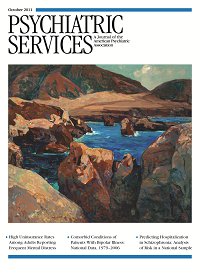Symptoms of Schizophrenia and Psychosis According to Foreign Birth in a Canadian Sample of Homeless Persons
Abstract
Objective:
The objective of the study was to examine the relationship between foreign birth and symptoms of schizophrenia and psychosis in a clinical sample of homeless persons.
Methods:
All the charts documented between 2002 and 2007 by a psychiatric outreach team in Ottawa, Canada, were retrospectively reviewed regarding country of birth and psychiatric symptoms identified in a clinical assessment. Data were analyzed by univariate and multivariate logistic regressions.
Results:
The sample included 552 men and 333 women with data on psychiatric symptoms and country of birth. A total of 106 individuals (12%) were born outside of Canada. This proportion was lower than that observed in the general population of Ottawa or in Canada. Foreign-born individuals were older and had a higher level of education than Canadian-born individuals. Sixteen percent of the sample presented symptoms of schizophrenia, and 15% presented symptoms of psychosis other than schizophrenia. In univariate analyses persons presenting symptoms of schizophrenia or psychosis were more likely to be foreign-born than native-born (odds ratio [OR]=2.92, 95% confidence interval [CI]=1.74–4.90, and OR=4.79, CI=2.92–7.86, respectively). Multivariate analyses gave very similar results (OR=2.62, CI=1.50–4.58, and OR=4.14, CI=2.44–7.03, respectively). A positive trend or significant association was observed for all regions of origin other than the non-Caribbean Americas.
Conclusions:
This is the first study to report an association between foreign birth and symptoms of schizophrenia and psychosis among homeless persons. These findings are consistent with the increased risk of schizophrenia and psychosis observed among immigrants to European countries. (Psychiatric Services 62:1187–1193, 2011)



